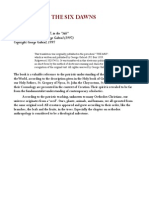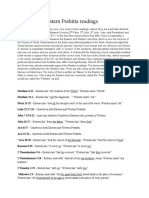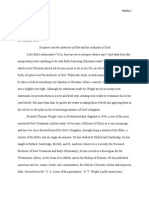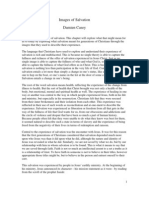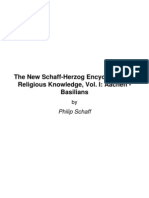Analogy of Being and Analogy of
Analogy of Being and Analogy of
Uploaded by
Marcelo LemosCopyright:
Available Formats
Analogy of Being and Analogy of
Analogy of Being and Analogy of
Uploaded by
Marcelo LemosOriginal Title
Copyright
Available Formats
Share this document
Did you find this document useful?
Is this content inappropriate?
Copyright:
Available Formats
Analogy of Being and Analogy of
Analogy of Being and Analogy of
Uploaded by
Marcelo LemosCopyright:
Available Formats
Analogy of being and analogy of faith By Protopresbyter John S.
Romanides (+) University Professor Platonic (and not only) ideas that penetrated the West led to its attachment to non-Christian axioms. One such idea was the analogy of being. And while the East never faced such attachments to philosophisms, in the West the subject was discussed extensively. We have already mentioned that there is no similarity between God and creations. And, since there is no similarity, it means that there is no similarity between the created and the uncreated. So, what is the metaphysical view* of theology? In order for metaphysics or ontology to exist, there must definitely be a certain analogy between the created and the uncreated. In the philosophical and theological tradition of the West, there are two analogies, in other words, two different correlations. In Orthodox Theology, however, no such things exist. Why? Simply because the Fathers stress that between the created and the uncreated, between creations and God, there is no similarity. This also means that there is no analogy between them, i.e., no correlation or comparison. Which means that we cannot, through creations, come to know the uncreated (=God), Himself or His energy. In Western tradition, the analogy that the Westerners have accepted as existing, has two forms: It is the analogy of being (analogia entis) and the analogy of faith (analogia fidei). The analogy of being was supported by those who followed Augustine. However, both analogies are found in Augustine, and he presents a confusion between the philosophical method of researching the Churchs dogmas and the scriptural research. In other words, apart from using the Holy Bible in his research, he also uses the methodology of logic and philosophical rumination. Also of great significance for the historical evolution of Western theology is the contribution of William Ockham, who was the father of Nominalism and who generally opposed the analogy of being. Nominalists reject every kind of distinction between divine essence and divine characteristics, in other words, between divine essence and energy; they maintain that this distinction exists only in name (Nominalists, from the Latin word nomen = name) On account of William Ockham, a tradition was created that did not accept the analogy of being, between the created and the uncreated. He maintained that we cannot trace any knowledge of God through philosophy. He had launched a general attack against Platos archetypes; in other words, against the Universalia of Platonic tradition, with very powerful arguments and almost abolished the preceding Platonic supporters of Western tradition, thus instigating a severe crisis in Western Theology. To Orthodox tradition, this is of extreme importance, since Platos and Neo-Platonists teachings on archetypes were officially condemned by the Orthodox Church. In the Orthodox Synodical that we cite on the Sunday of Orthodoxy, there is an official condemnation of this teaching of Plato and Neoplatonists and anathema is now officially pronounced by the Orthodox Church, on those who confess this Platonic teaching of archetypes. The reason for this is that the Platonic perception of God is clearly anthropomorphic. This teaching of archetype kinds in the mind of God essentially abolishes Divine freedom and comprises the entire gnosiological basis of the so-called Scholastic theological and philosophical tradition; in other words, the theology of Papists, wherein it is believed that there is an analogy of being and an analogy of faith between the created essences and the uncreated archetypes of ideas or reasons that supposedly exist in Gods mind. Thus,
according to this theory of theirs, one can trace that which pertains to the Divine essence, by penetrating the essence and the overall meaning of beings, through human logic. But this teaching, as we said, was condemned by the Eastern Orthodox Church during the 7th Ecumenical Council (Synod). In this way, the Patristic view that there is no similarity between the created and the uncreated, or, between creations and God, was established and consolidated. The aforementioned Platonic perception of God was embraced by Augustine and the entire Western tradition. William Ockham however did not abolish the analogy of faith, which, to him, is the Holy Bible. To him, the Holy Bible contains everything that pertains to God in reality. And, he maintains, that it is only through the Holy Bible that one can come to know God. According to the analogy of faith, there is an analogy between God and creations; not according to philosophical thought however (which is the analogy of being), but through revelation by God, as recorded in the Holy Bible. In other words, the analogy of faith says that God reveals to man those things that pertain to Him, inside the Holy Bible, and that man cannot learn anything correctly about God through philosophy. Of course here, Ockham launches an attack against Augustines philosophical method, but not against the theological method that is based on the Holy Bible, in other words, the analogy of faith. This analogy of faith was also followed by Luther, the founder of Protestantism. Luther had of course taught that there are two faiths. The one faith is the intellectual type, of logical acceptance. According to this faith, man accepts something with his logic and believes in that which he has accepted. But this is not the faith that vindicates man; when the Holy Bible says that man cannot be saved through faith alone, it doesnt imply the faith of a logical acceptance, but an intimate, inner faith. Luther observed that the Holy Bible mentions that there really is another faith that is a gift of God and that this faith is activated inside the heart. However, he reached this point but didnt go beyond it. He didnt complete this topic, by going in depth into the Patristic perception on the intimate kind of faith. In the Orthodox faith, the analogy of faith does not exist either. Because between the teaching of the Holy Bible and the truth regarding God, there is no analogy of faith. Because between the teaching of the Holy Bible and the truth regarding God and creations, there is no similarity whatsoever. For this reason, the meanings of the Holy Bible regarding God are rescindable meanings. They are rescinded, by the experience of theosis. Previously, they were simply auxiliary, necessary, correct and proper, but only as indicators leading to God. The Holy Bible is a guide towards God, but this description of God in the Holy Bible has no actual similarity to God. It speaks of God, it speaks of the truth, but it is not the Truth itself. It is a guide towards the Truth and the Path, which is Christ. Because the words contained in the Holy Bible are merely symbols which contain certain meanings. These meanings are all human and they lead to God, to Christ, and nothing else. Thus, when one simply reads the Holy Bible, he cannot properly theologize on the basis of the Holy Bible alone. If he does do that, he cannot avoid becoming a heretic, because the proper interpretation of the Holy Bible is accompanied by the experience of enlightenment or theosis. Without enlightenment or theosis, the Holy Bible cannot be interpreted correctly. Just as by simply reading a book on surgery, one cannot become a surgeon unless he takes lessons in Medical School and practices surgery near an experienced professor, thus it is with any other positive science, where one must practice in order to go from practice and
experience to the verifying and determination of the theory. In other words, a theory is determined whether it is true, through empirical practice, through empirical knowledge. In the same way, one who doesnt approach the Holy Bible through connoisseurs, i.e., through people who have attained the same experience as the Prophets or the Apostles, who are the Fathers of the Church, cannot become certain of the truth of the Holy Bible. The basis, the foundation of this experience, is elightenment and theosis, in other words, glorification _________________ * The ontological view of theology, because from the era of French Enlightenment, the terms metaphysics and ontology are correlated.
John S. Romanides, Patristic Theology , Parakatatheke Publications, 2004, pages 129 134, Prologue by Protopresbyter George D. Metallinos, Supervision-Commentary: Holy Mountain Monk Damascenos. Translation by: A. N.
You might also like
- J V Fesko - The Law Is Not of Faith - Calvin and Witsius On The Mosaic CovenantDocument53 pagesJ V Fesko - The Law Is Not of Faith - Calvin and Witsius On The Mosaic CovenantStuart Villalobos Tapahuasco100% (1)
- Rorty (1994) - A World Without Substances or EssencesDocument13 pagesRorty (1994) - A World Without Substances or EssencesFraan Maldonado VeraNo ratings yet
- On The Modern Cult of Factish Gods by Bruno LatourDocument42 pagesOn The Modern Cult of Factish Gods by Bruno LatourJack Gillbanks0% (1)
- Hebrews 1.3 - Patrick NavasDocument6 pagesHebrews 1.3 - Patrick NavasRubem_CLNo ratings yet
- Andrew LouthDocument3 pagesAndrew LouthiscaNo ratings yet
- New Testament With Dale MartinDocument4 pagesNew Testament With Dale Martinchocolatec00kieNo ratings yet
- Eusebius Preparation For The Gospel PDFDocument2 pagesEusebius Preparation For The Gospel PDFMichael0% (2)
- My Exodus From Roman CatholicisDocument45 pagesMy Exodus From Roman CatholicisMarcelo Lemos100% (1)
- Simple and Compound PropositionsDocument10 pagesSimple and Compound Propositionsdarlene martinNo ratings yet
- Ipsum Esse Subsistens - The God Who Is Verb - Eclectic OrthodoxyDocument6 pagesIpsum Esse Subsistens - The God Who Is Verb - Eclectic OrthodoxyPeter GeayleyNo ratings yet
- The Origin of The Septuagint CanonDocument15 pagesThe Origin of The Septuagint CanonEnrique VeraNo ratings yet
- LukeDocument424 pagesLukeDavid BaileyNo ratings yet
- The Works and Days of John Fisher An Introduction To TheDocument592 pagesThe Works and Days of John Fisher An Introduction To TheDEUSDETE SOARESNo ratings yet
- An Outline of The History of Christian Thought Since KantDocument114 pagesAn Outline of The History of Christian Thought Since KantCarlene Chynee LewisNo ratings yet
- Apostolic Canons, by Archbishop GregoryDocument17 pagesApostolic Canons, by Archbishop GregoryJerjis AlajajiNo ratings yet
- Karavidopoulos Ioannis, The Ecumenical Patriarchate's 1904 New Testament EditionDocument8 pagesKaravidopoulos Ioannis, The Ecumenical Patriarchate's 1904 New Testament EditionalmihaNo ratings yet
- Soteriological Issues in The 1999 Lutheran-Catholic Joint Declaration On Justification: An Orthodox PerspectiveDocument10 pagesSoteriological Issues in The 1999 Lutheran-Catholic Joint Declaration On Justification: An Orthodox PerspectiveakimelNo ratings yet
- Doctrine and Practice in The Early Church (Hall, Stuart George)Document276 pagesDoctrine and Practice in The Early Church (Hall, Stuart George)Frankle Brunno100% (2)
- Jesus in Islam-1Document4 pagesJesus in Islam-1Meaad Al-AwwadNo ratings yet
- Sermo, Verbum, Erasmus, The Czech New Testament of 1533Document8 pagesSermo, Verbum, Erasmus, The Czech New Testament of 1533luismendoza1No ratings yet
- Ancient Fathers On Instrumental Music by David VanbruggeDocument24 pagesAncient Fathers On Instrumental Music by David VanbruggeJohn Wesley Barker100% (1)
- The ReformationDocument18 pagesThe ReformationIlyes FerenczNo ratings yet
- Methodius-On The Leech 20151 PDFDocument8 pagesMethodius-On The Leech 20151 PDFArthur RoshNo ratings yet
- On An Early Fragment of The Qur'An: "Arabic Papyri From Hirbet El-Mird,"Document4 pagesOn An Early Fragment of The Qur'An: "Arabic Papyri From Hirbet El-Mird,"Daniel CookNo ratings yet
- Protoevangelho Tiago IslamDocument31 pagesProtoevangelho Tiago IslamCrossamania100% (1)
- Bull, Burton, Grabe. Defensio Fidei Nicaenae. 1851. Volume 1.Document396 pagesBull, Burton, Grabe. Defensio Fidei Nicaenae. 1851. Volume 1.Patrologia Latina, Graeca et OrientalisNo ratings yet
- 06 Lost GospelsDocument2 pages06 Lost Gospelsdavevan2010No ratings yet
- Lecture 1Document13 pagesLecture 1api-249898488No ratings yet
- A Brief History of The OT ApocryphaDocument7 pagesA Brief History of The OT ApocryphaJacob BainsNo ratings yet
- Brown Jewish ApologeticsDocument9 pagesBrown Jewish ApologeticsChandra SekarNo ratings yet
- Canon of NT by FF BruceDocument4 pagesCanon of NT by FF BruceStephen HagueNo ratings yet
- Ante Nicene Fathers Vol 10Document566 pagesAnte Nicene Fathers Vol 10Sounds For The Soul100% (2)
- Luther Vs UOJ PDFDocument183 pagesLuther Vs UOJ PDFwienslaw5804No ratings yet
- The Six Dawns by Dr. Alexander KalomirosDocument43 pagesThe Six Dawns by Dr. Alexander KalomirosMax RussoNo ratings yet
- Apostle Peter Biography - Timeline, Life, and DeathDocument16 pagesApostle Peter Biography - Timeline, Life, and DeathVianah Eve EscobidoNo ratings yet
- Gumerlock - The Tractoria of Prudentius of Troyes (Kerux.25.1 - 2010)Document13 pagesGumerlock - The Tractoria of Prudentius of Troyes (Kerux.25.1 - 2010)ack67194771No ratings yet
- Communication Theory. Perhaps The Most Important Observation Which The CommunicationDocument9 pagesCommunication Theory. Perhaps The Most Important Observation Which The CommunicationmulyadiNo ratings yet
- Eastern and Western Peshitta DifferencesDocument2 pagesEastern and Western Peshitta DifferencesJeremy Kapp100% (1)
- Answering Objections of IslamDocument1 pageAnswering Objections of IslamsogunmolaNo ratings yet
- Dokumen - Pub Henry of Ghent Metaphysics and The Trinity 9789461660886 9789058675378Document246 pagesDokumen - Pub Henry of Ghent Metaphysics and The Trinity 9789461660886 9789058675378juanpabloayonlopezNo ratings yet
- V.A. Delas Armas Aramaic New TestamentDocument312 pagesV.A. Delas Armas Aramaic New TestamentGil Delas ArmasNo ratings yet
- NT Wright Book Review Scritpure and The Authority of GodDocument9 pagesNT Wright Book Review Scritpure and The Authority of Godapi-276044662No ratings yet
- Secular, Theological, and Sociological Perspectives On Sects and CultsDocument141 pagesSecular, Theological, and Sociological Perspectives On Sects and CultsHenk van der Veen100% (1)
- Images of SalvationDocument8 pagesImages of SalvationSnejana MarkovaNo ratings yet
- Sharps Rule A Summary PDFDocument2 pagesSharps Rule A Summary PDFomegalink123No ratings yet
- Sobre El Texto Flaviano04Document24 pagesSobre El Texto Flaviano04scribduplNo ratings yet
- A Plain Introduction To The Criticism of The New Testament For The Use of Biblical Students PDFDocument600 pagesA Plain Introduction To The Criticism of The New Testament For The Use of Biblical Students PDFSameh SolimanNo ratings yet
- OLD TESTAMENT THEOLOGY Basic Issues in TDocument269 pagesOLD TESTAMENT THEOLOGY Basic Issues in TJosephmvpfulNo ratings yet
- Eunomius The First ApologyDocument11 pagesEunomius The First ApologyChaka AdamsNo ratings yet
- A Philosopher Looks at Jesus: Gleanings From a Life of Faith, Doubt, and ReasonFrom EverandA Philosopher Looks at Jesus: Gleanings From a Life of Faith, Doubt, and ReasonNo ratings yet
- A Review of DR Jason BeDuhn's Truth in TranslationDocument85 pagesA Review of DR Jason BeDuhn's Truth in TranslationAndreNo ratings yet
- Socrates Scholasticus - Historia EcclesiasticaDocument325 pagesSocrates Scholasticus - Historia EcclesiasticaPaisie Ipate100% (1)
- Christian MissionsDocument540 pagesChristian Missionshisjf100% (2)
- 1 Cor. 12, Call Upon The Name of The Lord JesusDocument10 pages1 Cor. 12, Call Upon The Name of The Lord Jesusmacovei003No ratings yet
- The New Schaff-Herzog Encyclopedia of Religious Knowledge-Vol IDocument942 pagesThe New Schaff-Herzog Encyclopedia of Religious Knowledge-Vol Ichaiko100% (1)
- Are The Modern Versions Based On Westcott-HortDocument8 pagesAre The Modern Versions Based On Westcott-HortLawrence GarnerNo ratings yet
- Robert Dick WilsonDocument2 pagesRobert Dick WilsonSpirit of William Tyndale100% (1)
- Orthodoxy and Heresy in Second-Century R PDFDocument17 pagesOrthodoxy and Heresy in Second-Century R PDFStefan StaretuNo ratings yet
- Hippolytus of RomeDocument289 pagesHippolytus of RomeTroy ChevalierNo ratings yet
- Romans 9 11Document56 pagesRomans 9 11Wayne SearfossNo ratings yet
- Inspired Subjectivity and Hermeneutical ObjectivityDocument13 pagesInspired Subjectivity and Hermeneutical Objectivitysizquier66100% (2)
- Jesus, Son of MaryDocument19 pagesJesus, Son of MaryIslamHouseNo ratings yet
- Wake, Burton, Reeves. The Apostolic Fathers. (1888-1889?) - Vol. 1.Document324 pagesWake, Burton, Reeves. The Apostolic Fathers. (1888-1889?) - Vol. 1.Patrologia Latina, Graeca et OrientalisNo ratings yet
- Ancient Christian Wisdom and BeDocument20 pagesAncient Christian Wisdom and BeMarcelo LemosNo ratings yet
- In Defense of The SeptuagintDocument2 pagesIn Defense of The SeptuagintMarcelo LemosNo ratings yet
- Expiation, Blood & AtonementDocument2 pagesExpiation, Blood & AtonementMarcelo LemosNo ratings yet
- Religion Is The Opium of The PDocument3 pagesReligion Is The Opium of The PMarcelo LemosNo ratings yet
- Eucharist, Bishop, Church The UDocument156 pagesEucharist, Bishop, Church The UMarcelo LemosNo ratings yet
- Lessons On Christian DogmaticsDocument268 pagesLessons On Christian DogmaticsMarcelo LemosNo ratings yet
- A Commentary On Coptic ChristolDocument16 pagesA Commentary On Coptic ChristolMarcelo LemosNo ratings yet
- Historyofpopest01rank DjvuDocument377 pagesHistoryofpopest01rank DjvuMarcelo LemosNo ratings yet
- Computers in Industry: Emilio M. San Filippo, Farouk Belkadi, Alain BernardDocument13 pagesComputers in Industry: Emilio M. San Filippo, Farouk Belkadi, Alain BernardDwi YanyuniNo ratings yet
- The Barrett TaxonomyDocument16 pagesThe Barrett TaxonomyDylan Liew100% (1)
- Branches of PhilosophyDocument3 pagesBranches of Philosophyyvette18latagNo ratings yet
- Understanding The SelfDocument2 pagesUnderstanding The SelfChristine Ann SongcayawonNo ratings yet
- Bevir - 2008 - Meta Methodology - Clearing The UnderbrushDocument24 pagesBevir - 2008 - Meta Methodology - Clearing The UnderbrushhedehodoNo ratings yet
- Appeal To ForceDocument16 pagesAppeal To ForceMay Anne BarlisNo ratings yet
- Bertrand Russell - The Philosophy of Logical AtomismDocument7 pagesBertrand Russell - The Philosophy of Logical AtomismAlessio Di MarcoNo ratings yet
- Moral Virtue and MesotesDocument8 pagesMoral Virtue and MesotesBudoy Samaniego75% (8)
- Q10. Write in Detail About Inductive and Deductive Reasoning/arguments. Explain The Concept With The Help of ExamplesDocument4 pagesQ10. Write in Detail About Inductive and Deductive Reasoning/arguments. Explain The Concept With The Help of ExamplesAlian KhanNo ratings yet
- Introduction To Fuzzy Sets - 16900119031Document5 pagesIntroduction To Fuzzy Sets - 16900119031Shourja GangulyNo ratings yet
- Mysticism Its True Nature & Value - Alfred Bowyer Sharpe 1910Document264 pagesMysticism Its True Nature & Value - Alfred Bowyer Sharpe 1910WaterwindNo ratings yet
- Lectures by Gilles Deleuze - On KantDocument35 pagesLectures by Gilles Deleuze - On Kantbobo-gogo0% (1)
- Conditional StatementsDocument12 pagesConditional StatementsJohn LagrazonNo ratings yet
- What Is Gestalt PsychologyDocument4 pagesWhat Is Gestalt PsychologyFarhad Ali MomandNo ratings yet
- Theory of The Boxed Reality: Chapter 1Document3 pagesTheory of The Boxed Reality: Chapter 1Eli RobertsonNo ratings yet
- Creating Categorica L SyllogismsDocument12 pagesCreating Categorica L SyllogismsEarl CalingacionNo ratings yet
- Top 44 Deepak Chopra Quotes To Inspire Your Inner WisdomDocument9 pagesTop 44 Deepak Chopra Quotes To Inspire Your Inner Wisdomsaikumar selaNo ratings yet
- ...Document437 pages...tjohns56No ratings yet
- BUCHANAN - 1992 - in Design Thinking Wicked Problems PDFDocument18 pagesBUCHANAN - 1992 - in Design Thinking Wicked Problems PDFleodeb1No ratings yet
- Giorgio Agamben-The Work of ManDocument6 pagesGiorgio Agamben-The Work of Man2radialNo ratings yet
- 6 Week Sed Prof 311 Module 6 - Foundations of Curriculum DevelopmentDocument7 pages6 Week Sed Prof 311 Module 6 - Foundations of Curriculum DevelopmentaetheticNo ratings yet
- Research Methodology and ApproachesDocument4 pagesResearch Methodology and ApproachesIOSRjournalNo ratings yet
- Chapter 4 Mathematical ReasoningDocument14 pagesChapter 4 Mathematical Reasoningaqiera100% (2)
- Toward A Comparative Translation and IntDocument3 pagesToward A Comparative Translation and Int123milkywayNo ratings yet
- Teaching and Learning Ontology and Epistemology in Political Science.Document9 pagesTeaching and Learning Ontology and Epistemology in Political Science.Antonio RibeiroNo ratings yet
- Tok U6Document12 pagesTok U6onoma topoeiaNo ratings yet
- Gujarat Technological UniversityDocument2 pagesGujarat Technological UniversityBhautik DaxiniNo ratings yet


































